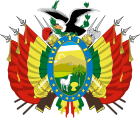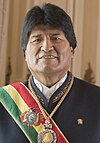
The politics of Bolivia takes place in a framework of a presidential representative democratic republic, whereby the president is head of state, head of government and head of a diverse multi-party system. Executive power is exercised by the government. Legislative power is vested in both the government and the two chambers of parliament. Both the Judiciary and the electoral branch are independent of the executive and the legislature. After the 2014 Bolivian general election, 53.1% of the seats in national parliament were held by women, a higher proportion of women than that of the population.

The president of Bolivia, officially known as the president of the Plurinational State of Bolivia, is head of state and head of government of Bolivia and the captain general of the Armed Forces of Bolivia.
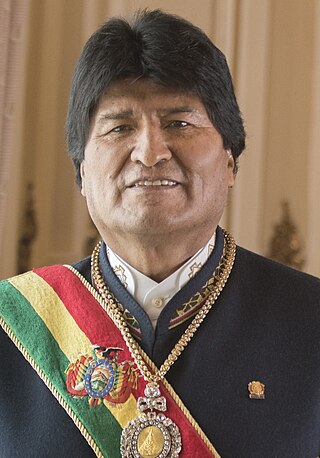
Juan Evo Morales Ayma is a Bolivian politician, trade union organizer, and former cocalero activist who served as the 65th president of Bolivia from 2006 to 2019. Widely regarded as the country's first president to come from its indigenous population, his administration worked towards the implementation of left-wing policies, focusing on the legal protections and socioeconomic conditions of Bolivia's previously marginalized indigenous population and combating the political influence of the United States and resource-extracting multinational corporations. Ideologically a socialist, he has led the Movement for Socialism (MAS) party since 1998.
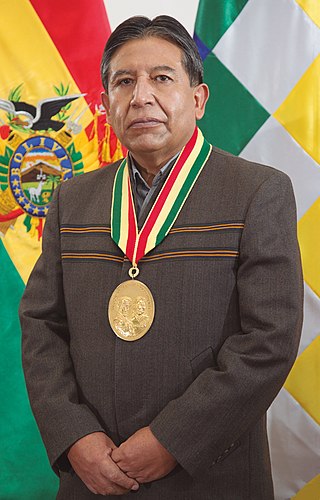
David Choquehuanca Céspedes is a Bolivian diplomat, peasant leader, politician, and trade unionist serving as the 39th vice president of Bolivia since 2020. A member of the Movement for Socialism, he previously served as minister of foreign affairs from 2006 to 2017 and as secretary general of ALBA from 2017 to 2019.

A constitutional referendum was held in Bolivia on 25 January 2009, postponed from the initially planned dates of 4 May 2008 and then 7 December 2008. Drafted by the Constituent Assembly in 2007, the new constitution was approved in the referendum according to an exit poll by Ipsos Apoyo for La Razón and ATB, a Bolivian television network. Furthermore, it required early elections to be held on 6 December 2009.
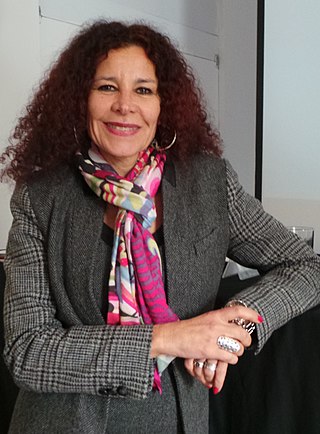
Elizabeth Cristina Salguero Carrillo is a Bolivian diplomat, journalist, politician, and women's rights activist who served as minister of cultures from 2011 to 2012. A member of the Movement for Socialism, she previously served as a party-list member of the Chamber of Deputies from La Paz from 2006 to 2009. In 2009, she was elected as a substitute party-list member of the Chamber of Deputies from La Paz but resigned before taking office in order to launch an ultimately unsuccessful La Paz mayoral campaign. From 2012 to 2015, she served as ambassador of Bolivia to Germany, and since then has worked as an international expert in strategic planning at UN Women.

The Ministry of Cultures, Decolonization, and Depatriarchalization is the ministry of the government of Bolivia that provides for the preservation and protection of the cultures and artistic expressions of the indigenous peoples of Bolivia as well as promotes the country's tourism sector and process of decolonization and depatriarchalization.

Luis Alberto Arce Catacora, often referred to as Lucho, is a Bolivian banker, economist, and politician serving as the 67th president of Bolivia since 2020. A member of the Movement for Socialism, he previously served as minister of finance—later minister of economy and public finance—from 2006 to 2017, and in 2019.

General elections were held in Bolivia on 12 October 2014, the second to take place under the country's 2009 constitution, and the first supervised by the Plurinational Electoral Organ, a newly created fourth branch of government. Incumbent President Evo Morales was re-elected for a third term.
Events in the year 2016 in Bolivia.

General elections were held in Bolivia on 20 October 2019. Voters elected all 130 members of the Chamber of Deputies and 36 senators and cast ballots for a joint slate of president and vice president. The Bolivian constitution allows the President and Vice-President to put themselves forward for re-election only once, limiting the number of terms to two, and the elections took place after in 2016 a referendum to amend the constitution was rejected, but that the Supreme Court of Justice ruled that all public offices would have no term limits despite what was established in the constitution and allowing Morales to run for a fourth term.

The 2019 Bolivian protests, also known as the Pitita Revolution, were protests and marches from 21 October 2019 until late November of that year in Bolivia, in response to claims of electoral fraud in the 2019 general election of 20 October. After 11 November 2019, there were protests by supporters of the outgoing government in response to Jeanine Áñez becoming the acting president of Bolivia. The claims of fraud were made after the suspension of the preliminary vote count, in which incumbent Evo Morales was not leading by a large enough margin (10%) to avoid a runoff, and the subsequent publication of the official count, in which Morales won by just over 10%. Some international observers expressed concern over the integrity of the elections.
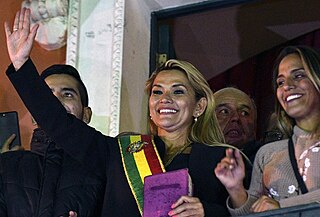
A political crisis occurred in Bolivia on 10 November 2019, after 21 days of civil protests following the disputed 2019 Bolivian general election in which incumbent President Evo Morales was initially declared the winner. The elections took place after a referendum to amend the Bolivian constitution, which limits the number of terms to two, was rejected in 2016. In 2017 under political pressure and a legal demand from the Morales government, the Constitutional Tribunal (TCP) ruled that all public offices would have no term limits despite what was established in the constitution and allowing Evo Morales to run for a fourth term.

Jeanine Áñez Chávez is a Bolivian lawyer, politician, and television presenter who served as the 66th president of Bolivia from 2019 to 2020. A former member of the Social Democratic Movement, she previously served two terms as senator for Beni from 2015 to 2019 on behalf of the Democratic Unity coalition and from 2010 to 2014 on behalf of the National Convergence alliance. During this time, she served as second vice president of the Senate from 2015 to 2016 and in 2019 and, briefly, was president of the Senate, also in 2019. Before that, she served as a uninominal member of the Constituent Assembly from Beni, representing circumscription 61 from 2006 to 2007 on behalf of the Social Democratic Power alliance.

General elections were held in Bolivia on 18 October 2020 for President, Vice-President, and all seats in both the Senate and Chamber of Deputies. Luis Arce of the Movement for Socialism (MAS) party was elected president in a landslide, winning 55% of the vote and securing majorities in both chambers of the Plurinational Legislative Assembly. The results of the election superseded the disputed results of the October 2019 elections, which were annulled during a prolonged political crisis.
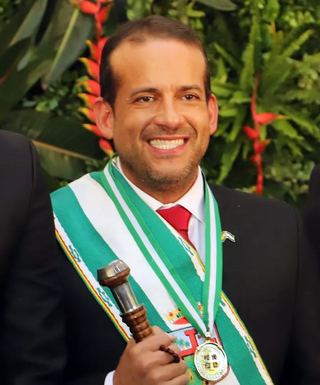
Luis Fernando Camacho Vaca is a Bolivian activist, businessman, lawyer, and politician serving as the 2nd governor of Santa Cruz since 2021. He is the leader of Creemos, opposition bench in the Plurinational Legislative Assembly and was the chair of the Santa Cruz Civic Committee in 2019.

Andrónico Rodríguez Ledezma is a Bolivian cocalero activist, political scientist, politician, and trade unionist serving as president of the Senate since 2020. A member of the Movement for Socialism, he serves as senator for Cochabamba. Rodríguez's lengthy career in the cocalero union hierarchy saw him serve as general secretary of the 21 September Workers' Center from 2015 to 2016 and as executive of the Mamoré Bulo Bulo Federation from 2016 to 2018, in addition to a multitude of other minor positions. He has served as vice president of the Coordination Committee of the Six Federations of the Tropic of Cochabamba since 2018 and held office as president of the organization from 2019 to 2020 in the absence of the body's longtime leader, Evo Morales.

Oscar Miguel Ortiz Antelo is a Bolivian businessman and politician who served as minister of economy and public finance from July to September 2020 and as minister of productive development from May to July 2020. As a member of the Social Democratic Movement, he previously served two terms as a senator for Santa Cruz from 2015 to 2020 on behalf of the Democratic Unity coalition and from 2006 to 2010 on behalf of the Social Democratic Power alliance. Nearing the end of his second term, Ortiz was his party's presidential candidate, attaining fourth place in the annulled 2019 general elections. During his first term, he served as president of the Senate from 2008 to 2010, the last opposition legislator to preside over the upper chamber as of 2024. Outside of national politics, Ortiz served as president of the Union of Latin American Parties from 2018 to 2021 and has been the rector of the Bolivian Catholic University at Santa Cruz since 2021.

Yerko Martín Núñez Negrette is a Bolivian agronomist and politician who served as minister of the presidency from 2019 to 2020. A member of the Social Democratic Movement, he previously served as minister of public works from November to December 2019. Throughout his ministerial tenure, Núñez was noted as a key person of influence in the transitional government and a "right-hand" to President Jeanine Áñez, a fellow Beni native. Prior to his appointment, he served as senator from Beni from 2015 to 2019 on behalf of the Democratic Unity coalition. As a member of Beni First, Núñez served as mayor of Rurrenabaque from 2010 to 2014; he previously held the position for two terms from 2000 to 2003 and 2005 to 2010 as part of the Revolutionary Nationalist Movement. Núñez's mayoral tenure saw strides made for Rurrenabaque's ecotourism industry, which generated increased economic growth for the city.

Martha Yujra Apaza is a Bolivian politician and trade unionist who served as minister of cultures and tourism from 2019 to 2020. A prominent trade union leader in El Alto, Yujra was the only indigenous member of the Jeanine Áñez Cabinet and was the final official to head the Ministry of Cultures and Tourism; the institution was abolished during her term. During her tenure, Yujra's office primarily dealt with the effects of the COVID-19 pandemic on the cultural sector, devising means of alleviating the economic ramifications of quarantine measures on artisans and entertainers. She subsequently served as a counselor at the Embassy of Bolivia in Quito from July to November 2020. Prior to serving as minister, Yujra gained notoriety for her fierce opposition to the government of Evo Morales. In 2017, she led a breakaway faction of the pro-government El Alto Regional Workers' Center. As its executive secretary, Yujra aligned the union with the Bolivia Says No alliance, running unsuccessfully to represent La Paz in the Chamber of Deputies in the annulled 2019 general elections.
